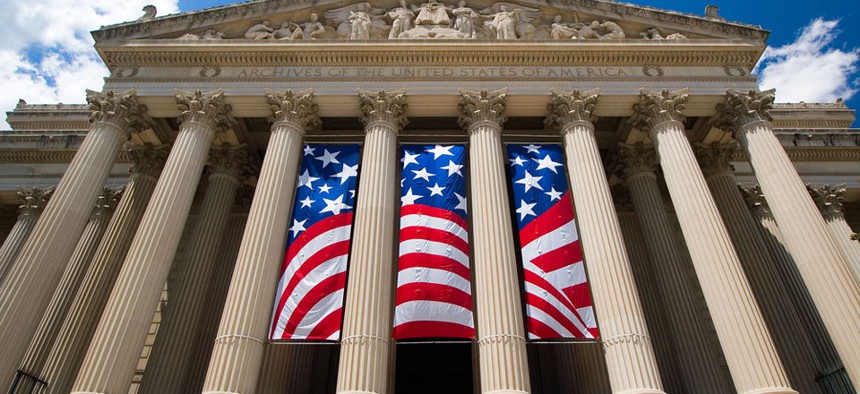National Archives Says Preserving Clinton’s Emails Could Take 30 Years

Costin Cojocaru/Shutterstock.com
It’s a long road from the former secretary’s inbox to the government agency, which doesn’t have the authority to implement record-keeping rules for other agencies.
Archiving federal records is no easy task. And preserving Hillary Clinton's emails for posterity will take decades, according to the National Archives, the final resting place for the correspondence at the center of the recent controversy.
In recent weeks, the Federal Records Act has received widespread attention following news that Clinton used a private email account to conduct official government business as secretary of State. The legislation, established in 1950 to provide guidance to federal agencies on record management, was amended last year by President Obama to include electronic records. But the National Archives can't guarantee that federal agencies are keeping records properly, and acquiring them takes considerable time.
"We started to change the way we think on how to manage email at federal agencies," Paul Wester, chief records officer at the National Archives told National Journal about the new record-management practices. "No more are we going to tolerate printing or filing emails in analog ways."
Agencies are legally required to manage their records and maintain a process for ensuring their preservation under National Archives statute 44 U.S.C. Chapter 31. The National Archives defers to federal agencies on categorizing records as temporary or permanent, but the record-keeping agency must sign off on the guidance the agencies use to do that.
"Values that we're looking for include things like, does the body of records document high-level policy of the agency? It's a subjective activity," Wester said.
It usually takes 15 to 30 years for records to be transferred to the National Archives.
"We want to have the records once [agencies'] activities are settled and are inactive," Wester said.
The challenge, however, is that most agencies don't have an automated way of preserving records, and instead file them manually. The State Department is one of those, inadvertently allowing emails to get lost in a cyber abyss. White House press secretary Josh Earnest acknowledged State's thin records-management capacity on Monday.
"They did not have a system in place to automatically save the emails. There is some evidence to indicate that at least some State Department employees were routinely saving their emails," he told reporters, adding that the department is working to improve the process.
The National Archives has been recording government business since its founding in 1934. Records include photographs, census documents, and—perhaps most important now, in the digital age—email correspondence. On average, only 3 percent to 5 percent are deemed by the National Archives to have permanent value and kept forever.
Because of the nature of Clinton's former job, most anything related to her work would be valued as permanent, including incoming and outgoing correspondence, and therefore required to be transferred to the National Archives after 30 years, according to the State Department Records Schedule, which is approved by the National Archives and provides guidance on record-keeping.
The National Archives wants to make sure that the State Department is doing this properly; it sent a letter to State about "potential issues" with the department's record-keeping this week.
"Our focus is on ensuring agencies are managing their records well, and if there are issues with the agencies, that they're correcting them," Wester said, adding in the letter that federal agencies are given 30 days to respond with an explanation about "safeguards to prevent records alienation incidents."
Nearly a year and a half after Clinton left office in 2013, the State Department requested that she, along with all previous state secretaries going back to Madeleine Albright, turn over records from their tenures in an effort to improve record-keeping practices. In response, Clinton and her team provided 55,000 pages of email to the department, as reported by The New York Times. Of those, 900 pages were turned over to the House committee that is investigating the 2012 attack in Benghazi.
Clinton said she reviewed the emails—determining what was personal and what was business—and turned work-related emails over to State "right away." The Times reported that Clinton didn't do that until two months ago.
Clinton has also said that the "vast majority" of her work emails were sent to state.gov accounts, and therefore would be preserved on government servers. The State Department has defended her, noting that what she did was "by no means unusual."
State Department spokeswoman Jen Psaki also suggested that agency employees may have been confused on what records were being automatically saved.
"I assume some assumed that was happening at the time as well," she told reporters earlier this month. "We're updating it because it's an imperfect system."
Obstacles to record-keeping are hardly new for the department, or for the more than 250 other federal agencies the National Archives oversees, including all Cabinet department.
While agencies have policies and procedures in place to archive emails, "there is little or no auditing for compliance," according to a 2013 Records Management Self-Assessment report conducted by the National Archives. The high volume of documents that flows through these agencies on a daily basis only compounds an already difficult process.
"It's very troubling," Nate Jones of the National Security Archive, a nonprofit group that gathers and disseminates U.S. documents, recently told Politico of the loose record-keeping practices at the State Department. "It's a wake up call, I think, for the public at large, which assumed everyone had Gmail capabilities and didn't realize how backward the government was."
In 2011, Obama signed a memorandum urging the executive branch to push for digital record-keeping. He signed another order a year later that called for more transparency in the process, requiring "further identification and transfer to NARA of the permanently valuable historical records."
In 2013, the National Archives introduced a records-management program called Capstone, which provides guidance for agencies on maintaining records through an automated or electronic process, to be implemented by Aug. 31, 2016.
But the National Archives can't ensure that agencies will properly adopt Capstone, or enforce across-the-board guidance regarding preservation of federal records. It can only require that agencies self-report their practices and explain how they're meeting the 2016 requirement to transfer to digital record-keeping. The oversight team at the National Archives also can conduct inspections of agencies to evaluate record-keeping management.
Although Wester recognizes that agencies have a commitment to record management and improving their processes, he admits "that there are probably some instances where the enforcement piece may be something that would be a bigger or different stick to have."
There's no indication whether the National Archives will acquire enforcement authority in the future. For now, record-keeping management continues to be a "work in progress," Wester said.
(Image via Costin Cojocaru/ Shutterstock.com)






